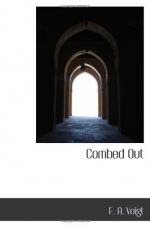A mass of French cavalry were galloping past. It was growing dark. The cannonade had become deafening. Over the town a few miles off there was a crimson glare in the sky.
A horde of civilians was thronging the main street of the village. Old men and women were carrying all that was left to them of their property on their backs. Others were pushing wheelbarrows heaped up with clothes and household utensils. Girls were carrying heavy bundles under their arms and dragging tired, tearful children along. White-faced, sorrowful mothers were carrying peevish babies. Great wagons, loaded with furniture and bedding, and whole families sitting on top, were drawn by lank and bony horses. A little cart, with a pallid, aged woman cowering inside, was drawn painfully along by a white-haired man. They passed by us in the gathering gloom, and there seemed to be no end to these straggling multitudes of ruined, homeless people who were wandering westwards to escape the disaster that threatened to engulf us all.
The eastern sky flickered with vivid gun-flashes and scintillated with brilliant shell-bursts. The night was full of rustling noises and sullen thunder-claps, while a more distant roaring and rumbling seemed to break against some invisible shore like the breakers of a stormy sea.
We retired to our huts and tents. Soon after lights-out the Police Corporal came round and shouted:
“Parade at 4.45 to-morrow morning in marching order.”
The tumult increased as though the surge were coming nearer and nearer. Shells of small calibre passed overhead with a prolonged whistle and burst with a hardly audible report. The thunder of bigger explosions shook the huts and caused the ground to tremble.
As I woke the next morning the din of the cannonade broke in upon my senses with a sudden impact. Rumbling, thundering, bellowing, rushing, whistling, and whining, the tumult seemed all around and above us. Sudden flashes lit up the whole camp so that for fractions of seconds every hut and tent was brilliantly illuminated. Multitudes of dazzling stars appeared and disappeared.
We drew our breakfast and packed up our belongings. All was confusion in the hut.
We paraded, the roll was called, and as the day began to dawn we marched off.
We passed down the main road in long, swaying columns of fours. We left the woodyard behind us and hoped it would be destroyed—how we hated the place for the dreary months we had spent there! The westward stream of refugees had ceased, but an eastward stream of French infantry and field artillery thronged the roads. The artillerymen were mostly tall and powerfully built. The infantry were nearly all elderly men of poor physique. They looked desperately miserable. We exchanged greetings:
“It’s a good war!”
“C’est une bonne guerre!”
And then we broke into song:
“Oh, Oh, Oh, Oh, Oh it’s a lovely war!”




